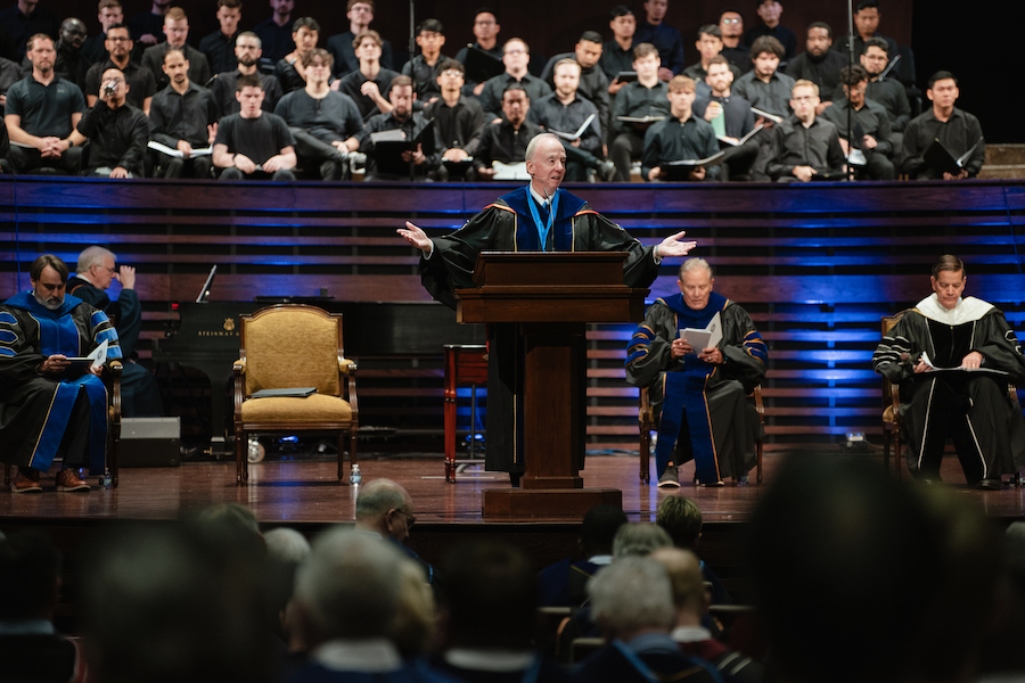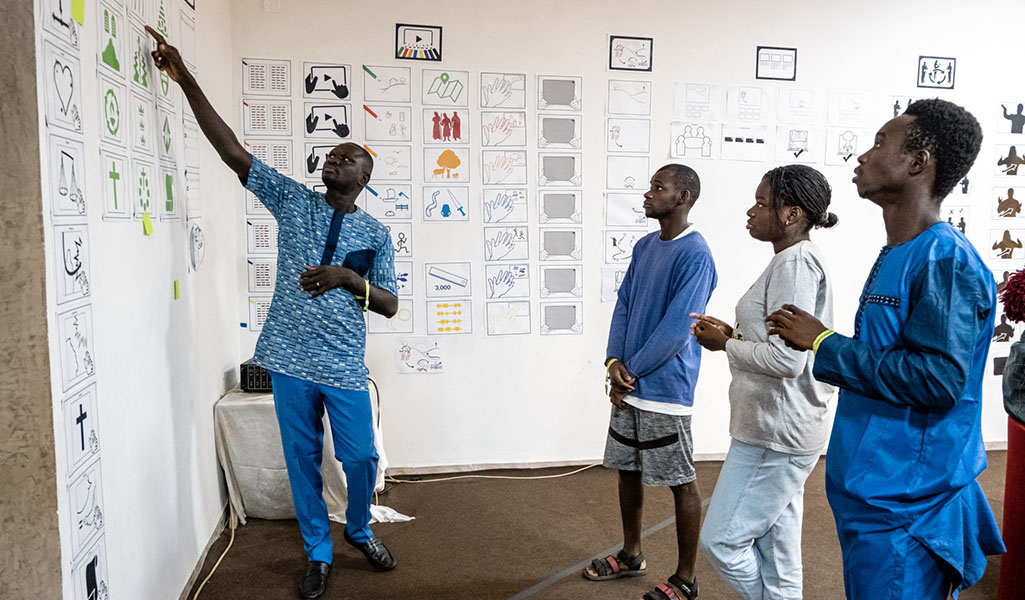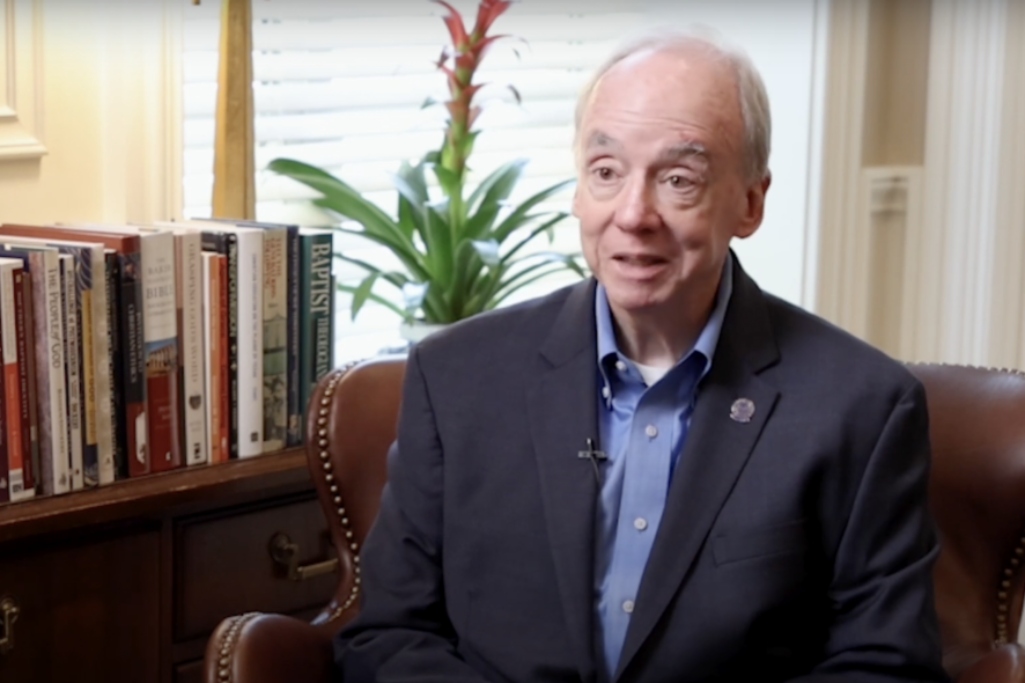
Dockery delivers the 2025 convocation address.
FORT WORTH, Texas — For the past 65 of its 117-year history, the presidents of Southwestern Baptist Theological Seminary (SBTS) have pronounced new students as “Southwesterners” during the convocation service beginning each academic year, starting under the fifth president, Robert E. Naylor.
President David S. Dockery did the same during the Aug. 26 convocation service opening the 2025-2026 academic year and went on to explain during his address what it truly means to be a Southwesterner, noting the faculty who have shaped the Southwestern theological tradition from which students benefit today.
Preceding his address, Dockery announced the seminary’s fall enrollment has increased again in new students, total students and total credit hours taught, providing a trajectory for a fourth consecutive year of enrollment increases.
“Singing is a marker of the joy and hope that has been present across the campus during these opening weeks,” Dockery said following worship led by Joe Crider, dean of the School of Church Music and Worship (SCMW), and the 105-voice SCMW choir.
The institution also installed Dean Sieberhagen as the new dean of the Roy J. Fish School of Evangelism and Missions. Dockery asked the Southwestern community to pray for Sieberhagen as his father died the night before the service.
New faculty introduced included Terry Coy, associate professor of theology and director of language programs, and Steven Gilbert, visiting assistant professor of intercultural studies and associate director of the Tandy Institute of Archaeology.
During his address, Dockery urged the seminary community to “work together, beginning afresh this morning, to reclaim and renew our commitments to the best of the Southwestern theological tradition. Let us hold firmly our commitments to these primary theological truths and Baptist distinctives with unswerving conviction because these primary doctrinal convictions … are essential for the life and health of the Southern Baptist Convention (SBC) and for Southwestern Seminary.”
Dockery said he is frequently asked about Southwestern’s theological identity.
“My response has been to point people to the founders, to that founding trajectory that has shaped the Southwestern theological consensus through the years,” he said, listing early leaders such as founder and first president B.H. Carroll and second president L.R. Scarborough. “… I want us all to understand who we are, what we believe, how Southwestern has changed through the years, and what these things mean for us now as we think about our shared future. This is not just my story; this is not some individual story. This is our shared story as ‘Southwesterners,’” he emphasized.
While commending all the SBC seminaries for each of their unique contributions to theological education, Dockery said, “Yet, Southwestern Seminary is distinctive from each and every one of these, as well as from the fine Baptist and evangelical colleges and universities across this country.”
He did not mean to suggest “superiority for Southwestern,” he added. “Yet, it is important for us to recognize that Southwestern is Southwestern. By this I mean Southwestern is special, that it has a distinctive spirit, ethos, purpose that needs to be acknowledged. On this day, it needs to be reclaimed, celebrated and guarded, and passed on to these new students and to the next generation.”
More information about previous and current faculty who have influenced the Southwestern tradition can be found in this year’s Seminary Hill Press publication, “Shapers of the Southwestern Theological Tradition,”the 400-page “gift that the faculty has given to us as we learn about those who’ve gone before us,” he said. The book, which is available for order here, was given to members of the seminary community following the convocation service.
Dockery said the place to begin in considering what it means to be a Southwesterner is the seminary’s identity statement noting its heritage as a Great Commandment and Great Commission institution that equips students to live their calling through Christ-centered education, as well as to remember the institution’s core values: grace filled, Christ centered, scripturally grounded, confessionally guided, student focused and globally engaged.
“These core values help to form the Southwestern community, to give it shape, to inform and guide us each and every day,” Dockery said, adding it applies to students, staff, faculty, board members and friends of Southwestern.
Southwesterners must also recognize the seminary’s biblical foundations have been passed along by prior, faithful saints and now must be taught to future generations.
“As this takes place, men and women will be built up and encouraged in their faith, the gospel will be spread, error will be challenged, the church will be strengthened and the kingdom of God will be extended,” Dockery said.
He also noted the mission of Southwestern is distinctive.
“We have not been called just to carry out the work of Christian higher education or Baptist higher education in general,” Dockery said. “Nor have we been called just to advance the work of a generalized form of Baptist higher education. Rather, we’ve been called to be faithful to the best of the Southwestern heritage and to recognize what it means to teach, serve and study at Southwestern, to understand and to embrace this heritage and carry it forward in the very best we can in our work in scholarship, research, publication, teaching, learning, discipleship and service.”
Dockery noted that the institution, its founder, early leaders and faculty members over the years were not perfect.
“There were some faculty members here 45 years ago when I was a student who were not just theological and denominational moderates, but a few who were progressives,” he said. “So, I am not attempting to paint the Southwestern heritage as unerring. Still, through the years, there is a clear continuity and consensus related to biblical authority as well as a carefully considered understanding of where differences of belief should be allowed.”
Starting with Carroll, Dockery also named New Testament scholar H.E. Dana and theologian James Leo Garrett Jr. as leaders who treasured the complete truthfulness and authority of Scripture, advocating for its supremacy above tradition, reason and experience.
While holding to the Bible as the ultimate source of authority, Dockery said Southwestern tradition also insisted “there is no place for rejecting confessional theology as foundational for all aspects of the life of Southwestern Seminary,” citing Garrett’s voice in this matter.
Dockery also said Southwestern tradition has long held a commitment to evangelism and missions, existing long before the creation of the Roy J. Fish School of Evangelism and Missions and found not just in missions classes but in ethics, Old Testament, theology and other courses as professors such as W. T. Connor, F.B. Huey, Ebbie Smith and Bill Goff championed the Great Commission.
“One cannot understand Southwestern Seminary without recognizing the commitment to the priority of evangelism and missions, both domestic and international,” Dockery said.
While theological convictions are vitally important to Southwestern tradition, Dockery said they are a poor representation when combined with “cold hearts, bitter spirits, cynical attitudes, gossiping tongues.
“Theological faithfulness, accompanied by warm-hearted and joyful piety, resulting in lives characterized by fervent prayer and gospel proclamation, point to the best of the Southwestern heritage,” Dockery said.
“Let us pray for one another, especially for our current and future students,” Dockery concluded. “Trusting the Lord that we and they — all Southwesterners — will be found faithful not only to the Southwestern tradition, but ultimately to our Lord Jesus Christ as we seek first the kingdom of God and His righteousness, doing so for a lifetime of ministry and service for the good of the people of God, the advancement of the gospel and the glory of our majestic God.”
The convocation address in its entirety can be viewed here.


